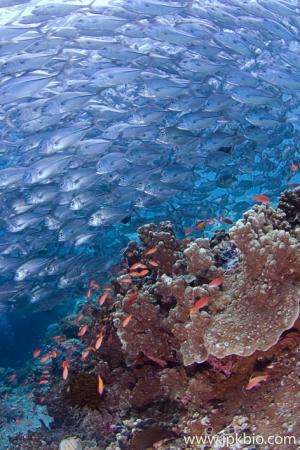Taking over the oceans: Adult fish characteristics predict a species' dispersal

As fish disperse to find new habitats, scientists have developed a new model to judge a species' success in colonising new places. The study has shown some surprising results, suggesting that success can best be determined in the traits of adult individuals, and not in a species' larval stages, as previously thought.
"The more places a tropical fish species lives," says lead author Osmar Luiz, "the less it is endangered to extinction. It is important, then, to identify exactly which features of a species can best determine the scope of their distribution across the oceans, so we can more accurately predict and identify endangered species."
Marine organisms disperse mostly by ocean currents as larvae. Until now, it has been thought that species with longer larval periods can disperse further, and achieve larger geographic distribution across the oceans – thus having a lower chance of extinction.
However, Luiz and team found that, instead of this larval stage, there are some specific adult characteristics of species that can better predict distribution size among these species. He points to the colonization success, of when new populations build up in a new area, as a better determinant of ongoing species safety.
"Our study warns that predictions of species dispersal potential based on the variability in they larval stage are misleading, and we indicate three other adult characteristics that relates to dispersal ability and should be used in such analysis."
"Very counter intuitively, these characteristics manifest while fishes are adults, so we were until now looking into the wrong life-stage," says Luiz.
These characteristics are schooling, nocturnal activity, and large size. These three characteristics emerged across different oceans despite interregional differences in habitat geography.
The comprehensive study used the largest dataset in analysis of this type, collecting data for 590 species, across three different oceans. Luiz and his supervisor Joshua Madin have been exploring the dispersal patterns of tropical fish for some time, both globally and in Australia, through the SIMS facilities in Chowder Bay, Sydney.
More information: Luiza, O. et al. Adult and larval traits as determinants of geographic range size among tropical reef fishes, PNAS. www.pnas.org/cgi/doi/10.1073/pnas.1304074110
Journal information: Proceedings of the National Academy of Sciences
Provided by Macquarie University



















